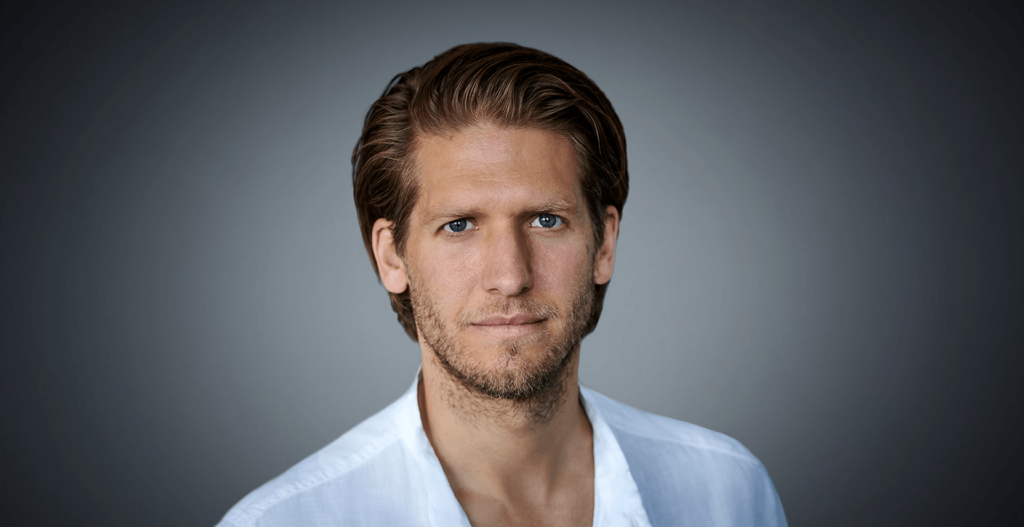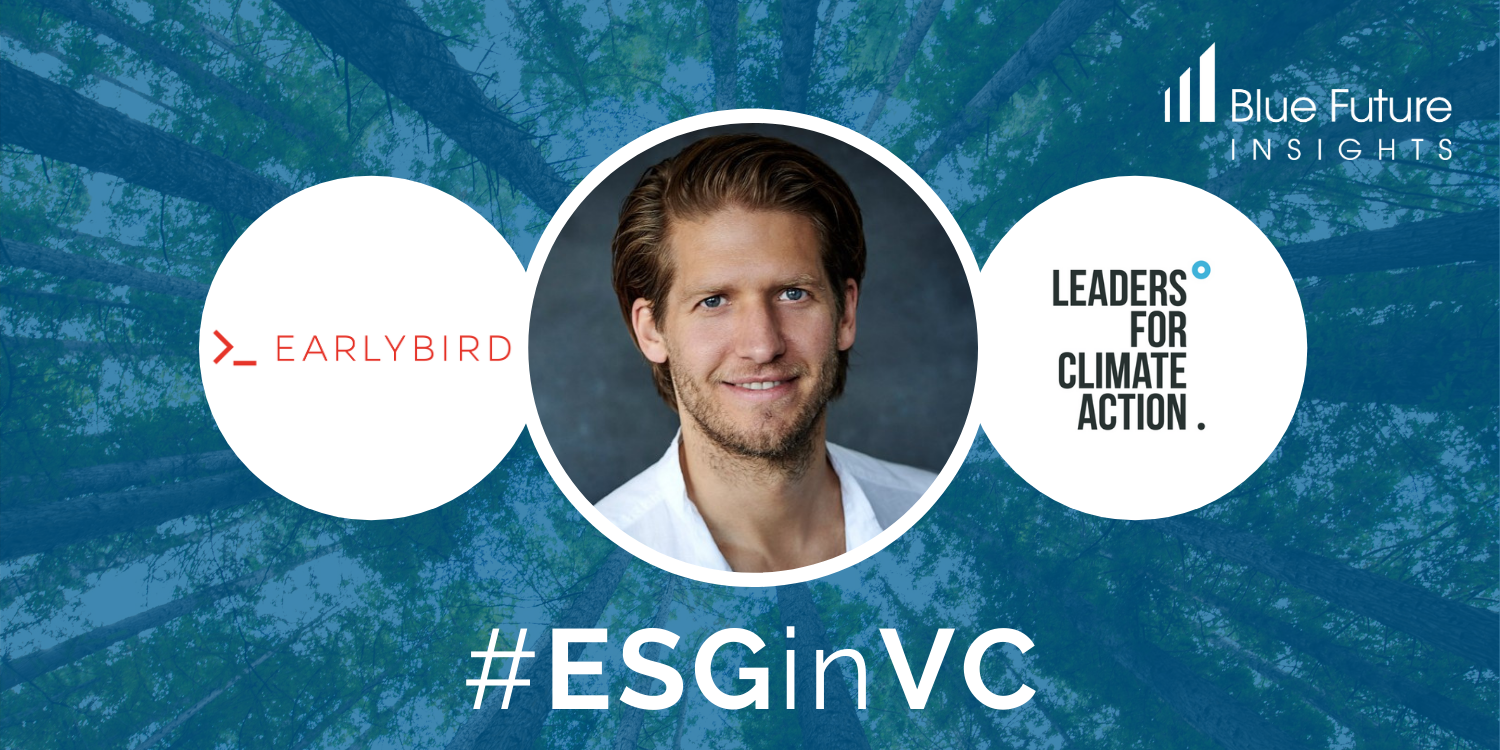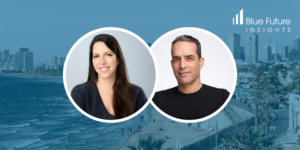With our ##ESGinVC initiative, we want to foster a discussion around ESG and help each other develop and improve our frameworks. As part of this initiative, we spoke to leading managers and LPs about their ESG frameworks. The long-form interviews will be published in a reader on our website, while we will regularly post interview extracts on our social media channels (Linkedin — Twitter — Medium).
The extract below is from the interview with Fabian Heilemann, Partner at Earlybird Venture Capital and co-founder of Leaders for Climate Action.
Coming soon: Kanyi Maqubela (Kindred Ventures), David Teten (Versatile VC), Liz Broderick & Chrys Chrysanthou (Kindred Capital), Farooq Abbasi (Preface Ventures), Kinga Stanislawska (Experior VC & European Women in VC), Bettina Denis (Gaia Capital Partners), Ha Duong (Ocean Investment), Andreas Surya & Richie Wirjan (Kejora Ventures) and Catherine Dupéré (Isomer Capital).
—
How did Leaders for Climate Action get started?
Fabian Heilemann: I have a few friends who are all internet entrepreneurs and investors from Berlin and more or less ambitious surfers. On a surfing trip one and a half years ago in Tenerife, there was a day with little waves.
We got into a long discussion around climate change, our role in this crisis and if we are doing enough as entrepreneurs and investors. At the time, most of us were offsetting our carbon footprint, but that was mostly it. Nobody was politically active or really leveraging her or his assets.
This conversation was the starting point and over the next couple of months, we as a group committed to taking action by starting Leaders for Climate Action. Since then, over 400 companies with 100,000 represented employees have joined; we´ve expanded to other European countries and achieved more than a quarter million tons of carbon reduction and offsets in a little over a year.

What are your main initiatives with Leaders for Climate Action?
Fabian Heilemann: Our primary objective is to help entrepreneurs run their companies in a much more eco-sustainable way than they did before. This includes their entire up — and downstream supply chain, their office environments, and travel policy.
We empower them by providing scientifically-verified frameworks to measure and offset their carbon footprint on an annual basis, so essentially, it’s a reinforcement cycle. The measuring is done together with third-party climate auditors, where different measures –depending on the industry– come into play for the reduction.
For example, a software company where most of the footprint comes from server electricity is a completely different game than let´s say Zalando, which ships physical fashion products across the world. When it comes to offsetting, we cooperate with Gold Standard certified partners to really yield the results that are promised.
“Our political agenda is very narrowly focused on implementing a Germany- and European-wide price per emitted carbon ton north of 80 to 100 Euros.”
Fabian Heilemann: The secondary objective of Leaders for Climate Action is lobbying work. We coordinate efforts to publish papers, speak on panels, meet politicians on a national level and increasingly European level, and harness the power of our member brands like Zalando, Flixbus, Celonis, and Delivery Hero to gain attention from political decision-makers.
Our political agenda is very narrowly focused on implementing a Germany- and European-wide price per emitted carbon ton north of 80 to 100 Euros. Today, politicians are talking about 20 Euros per ton, but only at the level of 80–100 Euros will it really have an impact on changing consumer and enterprise behavior. At 20 Euros a ton, it simply goes unnoticed.
How do you see the approach to ESG changing in tech companies, independently from investors?
Fabian Heilemann: Especially in the past six months, alongside Covid, Black Live Matters, and climate change becoming so obvious that you can´t ignore it, there has been a strong uptick in the ESG momentum across tech companies. You can see with the pledges by Apple, Amazon and Google that the giants are making serious efforts to become carbon neutral in the next 10–15 years.
“In the end, it is all about accepting entrepreneurial responsibility for the people and the planet and not seeing yourself as a pure financial profit generator.”
Fabian Heilemann: Here too, different business models require different measures. For some, it is easier to get there, for some it is harder and will take longer. But generally, there is a very strong momentum towards accepting responsibility. In the end, it is all about accepting entrepreneurial responsibility for the people and the planet and not seeing yourself as a pure financial profit generator who doesn’t care about the damages one creates while generating profits.
What are the main costs and benefits of implementing ESG policies?
Fabian Heilemann: That is a complex question, because you can think of costs in purely financial terms, but also in terms of cultural costs, brand costs, and so on. If we first stick to the economic costs and benefits, using fully renewable electricity in most countries usually comes in 10 –20 % more costly than using fossil energy. But this is one of the few cases where you get higher costs if you choose to be sustainable. The majority of measures will actually save you costs. For example, if you choose LED lights to run your office, it is more sustainable and saves energy. The same is true for moving meetings online and travelling less.

By and large, most sustainability measures help to save costs. The only add-on that is really an incremental additional cost layer is the offsetting. If you don’t do it, it costs zero. If you do it, depending on the magnitude of your emissions, you will get high-quality offsetting at around 10–20 Euros per ton. Paying one or two Euros per ton is simply not enough, but also you don’t have to pay 100 Euros.
But to put things into perspective: At an investment company like Earlybird, with a couple of millions of OPEX a year, we emit a few hundred tons of CO2. That means we are talking about 4.000–8.000 Euros to compensate all emissions. Compared to millions of operating costs annually, that is not even 1%. It does depend on the business model, but most businesses should be able to absorb this incremental cost of offsetting.
“If you want to attract talents from generations X, Y and Z, you cannot ignore your ESG policies and your multidimensional ESG footprint.”
Fabian Heilemann: When it comes to the benefits, many measures automatically result in savings because they consume less resources. That can be energy, but it can also be other natural resources. On top of that, you can also think about ESG in a broader sense. We need to be mindful of the studies by the likes of McKinsey showing that smarter and more balanced decision-making originates in teams with high academic, cultural and gender diversity.
Last but not least, if you want to attract talents from generations X, Y and Z, who are much more mindful of the impact and role of a company in the ecosystem, you cannot ignore your ESG policies and your multidimensional ESG footprint. Otherwise, you will simply not be attractive to the best talent of the younger generations.
—
About Fabian Heilemann
Fabian Heilemann is a serial tech entrepreneur and early stage VC investor based in Berlin. He is a co-founder of DailyDeal (tradesale to Google in 2011) and Forto (raised > $ 120 mn. funding within 4 years from launch). Fabian’s investment track record includes > 45 early-stage investments (Seed / Series A) since 2011 with a focus on SaaS, Platforms and Consumer. He is a General Partner at Earlybird and invested in companies like Lexoo, Sennder, Kreatize and McMakler. In 2019, Fabian co-founded Leaders for Climate Action, a community of entrepreneurs and investors that counters the climate crisis by implementing effective measurement, reduction and offsetting of carbon emissions of tech-companies and demands effective carbon-emissions-pricing from policy makers.
Linkedin
About Leaders for Climate Action
Climate Change is threatening the existence of human life on this planet. We have been ignoring the problem far too long, hoping that politics or technology will solve it. Leaders for Climate Action was launched in 2019 in Berlin and has grown to a community of 700+ founders from all over the EU, united by the mission to decarbonize the digital industry.
Website — Linkedin — Twitter
AboutEarlybird
Founded in 1997, Earlybird invests in all development and growth phases of technology companies. Among the most experienced venture investors in Europe, Earlybird offers its portfolio companies not only financial resources, but also strategic and operational support, as well as access to an international network and capital markets.
Earlybird Venture Capital has grown to three autonomous, dedicated and specialized teams, focusing on different geographies and sectors.
Website — Linkedin — Twitter — Medium
About Marco Cesare Solinas
Marco is an Analyst at Blue Future Partners, where he is responsible for sourcing and analysing new investment opportunities. He is passionate about Technology and Venture Capital and making an impact with investments. He focuses on both direct and indirect investments.
Previously, he has built an international and multicultural background across Italy, US, Germany, Turkey and Malaysia. Marco holds a CEMS Master’s in International Management and a Bachelor in Economics and Finance from Bocconi University.
Linkedin — Twitter — Medium
About Blue Future Partners
Blue Future Partners is a Fund of Funds with decades worth of experience in investing in Venture Capital. We specialize in backing Emerging Managers focused on early stage technology investments. We are people-centric and relationship-driven. We have a global mandate and existing relationships with Emerging Managers in the US, Europe, Israel, China and South East Asia.
Website — Linkedin — Twitter — Medium








